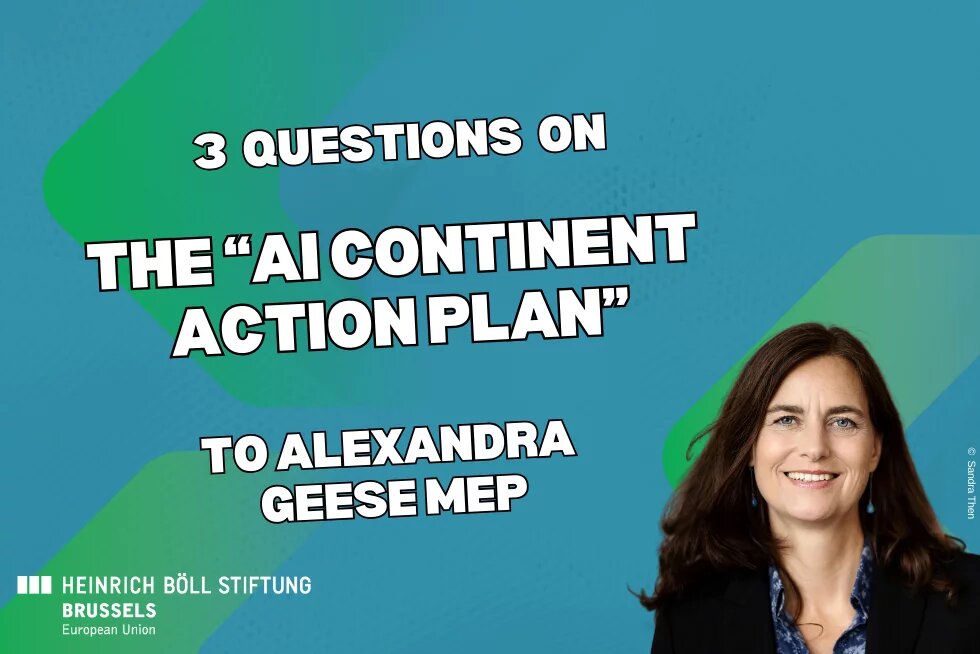We are in the middle of the AI race. On April 9, Digital Commissioner Henna Virkkunen presented the EU's new AI Continent Action Plan. The goal? Making Europe a global hub for AI innovation. No more talk of bans or limitations. The action plan is about boosting competitiveness and claiming leadership. We asked MEP Alexandra Geese (Greens/EFA) what this shift means.

The EU spent years negotiating the AI Act as a landmark piece of regulation. Now it appears the Commission is shifting focus towards simplification and competitiveness. How do you interpret this change in tone from guarding against risks to racing for global leadership?
The EU will be able to uphold its values if it controls and designs technology. The current geopolitical situation where big tech companies and US President Trump have struck an alliance is a challenge for Europe. AI technologies are controlled by US companies. Values and ideologies are deeply embedded in large language models (LLMs). The authoritarian tendencies of the new US administration and parts of Silicon Valley are deeply concerning for Europe because any shift in values will be reflected in AI technologies and impact our societies. The AI Act is an important milestone and we strongly criticise the current tendency to water it down. But its provisions are still in place. At the same time, it is important to ensure that European companies can easily implement it. The AI Act is essential to defend fundamental rights, but building European AI infrastructure is equally important. Europe should promote AI that improves the life of its citizens and contributes to saving the planet, setting out its own agenda. For example, smaller LLMs with lower energy consumption that are tailored to specific areas like health care, climate or a specific industry seem to be a promising avenue. Europe’s strengths in a world increasingly governed by authoritarian regimes are democracy, rule of law and fundamental rights.
The Action Plan outlines ambitious investments in AI infrastructure. From supercomputers to so-called ‘gigafactories’. In your view, are these plans realistic, and will they help Europe compete with AI giants like the US and China?
I strongly support the creation of a powerful network of supercomputers and gigafactories in Europe. No single company in Europe can compete with US or Chinese companies, but a public European network can be an excellent starting point. Network-building and sharing resources is the right way to build an innovative European AI landscape. We should not try to imitate the US or China, but rather focus on a European way. AI needs to solve real problems, rather than increasing consumption or extending surveillance. Scale is not always the best answer. We should leverage high-quality data, for example in manufacturing or in the cultural sector and focus on real added value to people’s lives. At the same time, we need to mobilise private investment. The real reason for Europe lagging behind in digital technology is the fact that European investors have long shied away from digital start-ups and scale-ups, forcing new companies to relocate to the US to raise sufficient capital. A European capital markets union is urgently needed, as well as creating a momentum for European digital technologies, for example through the EuroStack [Europe's own comprehensive digital infrastructure], to convince investors who today invest in the US, to give European companies a chance. The online advertising market is a further potential source of private funding. Today, European advertiser’s money goes mainly to Google and Meta, who have built an intransparent oligopoly that threatens our free press. It is of utmost importance to regulate that market in a way that secures more competition, gives advertisers control over their ads and benefits publishers who create valuable content. This would also ensure that European money currently financing much of the AI development, at least for Google and Meta, stays in Europe and can be invested in technology made in Europe.
To make the AI Action Plan a reality much more computing power and datacentres in the EU are needed. As the uptake of AI increases, the demand for energy, water and hardware increases too. This surge in energy use raises concerns about efforts to reduce greenhouse gas emissions. Are we sacrificing our sustainability goals in the AI arms race?
AI is a serious threat to our sustainability goals. The US AI industry is already calling for nuclear power to feed its energy hunger. This is also an important reason for Europe to build data centres according to its own standards. Renewable energy is key to powering data centres. Unfortunately, the Commission's communication does not clearly state that these data centres should be built by European companies. US companies are already trying to push the US administration to blackmail Europe, threatening to impose tariffs in response to fines imposed on their companies for breaking European laws, so they can’t be trusted to comply with our sustainability laws.
European cloud providers already have a strong focus on energy efficiency and do not threaten democratic governments. They can also guarantee that the data they store and process stays in Europe and cannot be handed over to foreign governments. In the EU Cloud and AI Development Act, the Commission needs to introduce a clear preference for European cloud providers. High energy efficiency standards are important, but we also need to invest in technologies that allow us to reduce water consumption. The Communication announces a Water Resilience Act, which must be rigorous. At the same time, future technologies like quantum computing, which could drastically reduce energy consumption, are crucial. The Commission also announces a particular focus on high energy efficiency for chip design. While the high energy and resource consumption of AI is a serious threat to our sustainability and climate goals, the EU should focus on AI with a low energy and climate impact.


